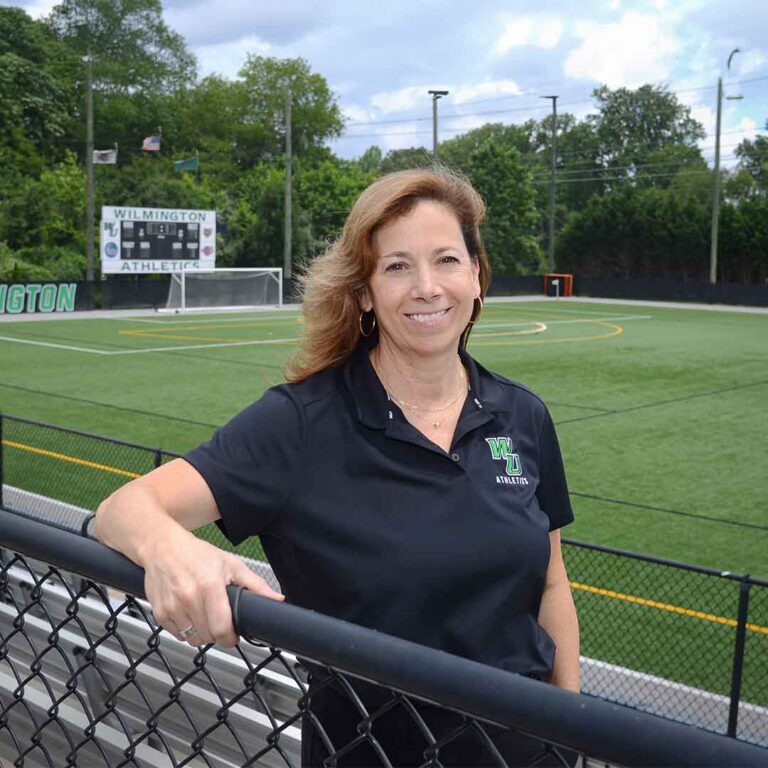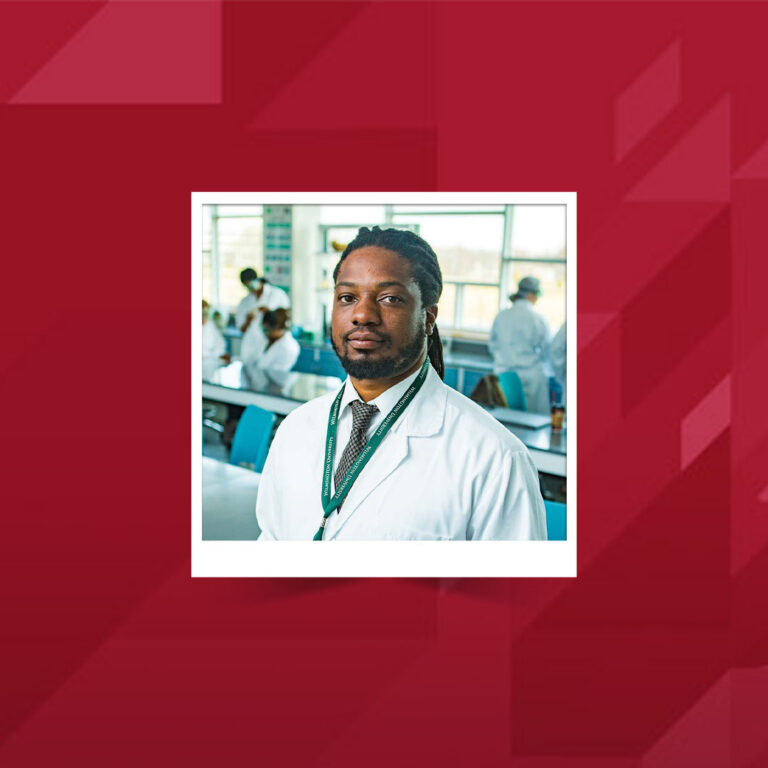Cyber Warrior
Ten years and two Wilmington University degrees after arriving in the U.S., Roberto Rodriguez is leading efforts to protect network security at Capital One.

When Roberto Rodriguez arrived in the United States at the age of 16, he couldn’t speak or write a full sentence in English. He also had no idea how to properly sweep or mop a floor, which, he discovered, are necessary skills when you can only get basic jobs because, well, you don’t know English.
To learn the language, he began watching movies — at least 100 of them, by his estimate. “Also, I remember sticking little pieces of paper on different appliances at home with their names in English,” he says. “Sometimes, it was so hard I cried.”
But he stuck with it, calling on the steely resolve (he likes to use the American term “grit”) that has enabled him to earn two degrees from Wilmington University, start his own cyber security company, and become a cyber security leader at one of America’s largest banking institutions — all in just 10 years.
Rodriguez was born in Miami but when he was 2, his family moved back to Peru, their native country. There, he and his two older brothers enjoyed a middle-class life with a father who was a computer programmer and a mother who taught kindergarten.
“My mother was very strict with everything,” he says, “especially school.”
Young Roberto was a good student and athlete, playing soccer and volleyball and running the 100 and 400 meters in track. “I really wasn’t interested in computers,” he says. “I loved dogs, and at first I wanted to be a veterinarian. Then I thought about electrical engineering.”
Like most Peruvian students, he graduated from high school at 16. That’s when his father told him he must return to the United States before he was 18 or risk losing his U.S. citizenship. It came as a shock to Roberto, who had already applied to a university in Peru. But his father insisted, and he arranged for Roberto to live with a cousin in Newark, Delaware. To ease the transition, his father also moved to Newark, but stayed only three months. When he left, Rodriguez says, “It was a very hard time for me.”
Gradually, he began learning his new country’s language, bringing home a new movie almost every night, both with and without Spanish subtitles. He chose crime stories and dramas for their more realistic dialogue.
“I would pause them over and over,” says Rodriguez, “and try to translate what they were saying.”
He bought a dictionary of idioms and also began learning “phrasal verbs” — phrases that combine a verb with a preposition or adverb, or both, whose meaning is different from the combined meanings of the individual words. These can be especially problematic for anyone new to English. For instance, Rodriguez learned that “I ran into my friend at the mall” does not mean that there was a literal collision. Soon he was able to use phrases like “I ran out of fries,” now knowing that it meant more French fries were needed.
Says Rodriguez: “It helped me to feel like I was speaking like anybody else out there.”
His new facility with language helped him land a job at McDonald’s, and that’s where he was introduced to cleaning floors.
“We had a maid in Peru, which is not unusual there,” says Rodriguez, “and our parents wanted us to focus on school.” As a result, he did almost no household chores like, say, cleaning floors.
But he was a quick learner. He soon became proficient with a broom and mop, and after about a month he was promoted to the kitchen. There he found an English teacher of sorts: an older man, who, Rodriguez noticed, wore an ankle bracelet, of sorts. Despite the man’s criminal past, he proved an effective mentor.
“He would teach me a couple of words a day,” says Rodriguez. “Everyday words. Like, he would point to his apron and then say the word.”

Meanwhile, he had enrolled at Delaware Technical Community College to study Computer Network Engineering. At about the same time, he got a job at a McDonald’s that was closer to home. There, yet another co-worker became an English teacher, concentrating on slang terms. Which had its downside.
“One Sunday I hurt my back, and I asked him how to say that [with a colloquialism],” says Rodriguez. The co-worker eagerly complied, teaching him a term containing an obscenity followed by “up.”
The next day in class, the teacher asked students to describe their weekends. Rodriguez, always eager to practice his new language, raised his hand. The teacher called on him and invited him to come to the front of the class, where he described tweaking his back, proudly using the hyphenated term he had just been taught. The class laughed, the teacher asked him to step into the hall for a short discussion, and Rodriguez learned another lesson: Americans are fond of practical jokes.
Despite moments of embarrassing miscommunication, his education was progressing nicely and he was gaining confidence. He joined the soccer team and earned a partial but substantial scholarship.
It was on the soccer pitch that he first encountered Wilmington University. “We beat them 2-1, and that was the first time DelTech ever beat Wilmington,” he says. “That was an epic game for us. Of course, we played them again later and we lost.”
The game also introduced him to WilmU, and he was impressed with its soccer team’s uniforms, equipment, coaching staff, and even the mascot, Wiley D. Wildcat.
So, after earning his associate degree from DelTech in 2012, he almost immediately enrolled at WilmU, switching his major to Computer Network Security. “I decided stopping cyber criminals would be more interesting than dealing with switches, routers and modems,” he says.
He continued to work full-time, and as his English improved, so did his jobs. He was a manager at Olive Garden in Elkton, Maryland, when he entered WilmU. On his first day of classes, he encountered Dr. Ed Guthrie, who had been a customer at the restaurant. Dr. Guthrie, who was then dean of Technology and is now dean of the College of Social and Behavioral Sciences, complimented Rodriguez on the leadership qualities he had displayed as a manager.
“He told me he had seen me talking with servers and sitting down with customers, and sort of keeping things calm,” Rodriguez says.
Rodriguez called his parents that night to thank them for their guidance on how to interact with people. “They told me to always smile, be friendly, make eye contact, say hello to people,” he says.
He says that Dr. Guthrie and his wife, Connie, have become mentors to him. “In fact,” he says, “I call them my American parents.”
Dr. Guthrie, in turn, calls Rodriguez “the epitome of a Wilmington University student. He works full-time and he’s looking for opportunity, and he was able to take advantage of our Work-Integrated Learning program.”
I was impressed with Roberto’s professionalism and his character,” he adds. “Again, the epitome of a Wilmington University student.
— Dr. Guthrie
After earning his bachelor’s in 2014, Rodriguez took a two-month break, then enrolled in WilmU’s Master of Science program with a concentration in Information Assurance. He excelled, compiling a 3.89 grade point average.
He was also on the three-member team of graduate students who entered the 2015 Cyber 9/12 competition. The first WilmU team to take part in the prestigious event, they went up against such schools as MIT, Carnegie Mellon, Purdue, and Brown. Demonstrating that he had indeed gained proficiency with English, Rodriguez was chosen to give the final presentation before the judges, and the team won the Most Creative Policy Response Alternative award. He has been asked to help coach the team during several competitions this summer.
While he was finishing his bachelor’s program, his employment picture brightened once again. Finally leaving the food service industry behind, Rodriguez got a job in his chosen career field, cyber security, joining MySherpa, a Wilmington firm specializing in IT services and computer security.
After a year-and-a-half, seeking more challenges, he left My-Sherpa to form his own company: HumanFirewalls. He recruited three WilmU students and offered services such as security awareness, threat intelligence, network security monitoring, vulnerability management, and cloud-based web and email security.
In the meantime, he took a full-time job with DuPont as a member of its Cyber Security Incident Response team in Wilmington, where he helped protect the organization’s trade secrets from targeted sophisticated attacks. The job lasted only about 18 months, when the DuPont/Dow merger became a reality, and he moved on to Capital One at the financial corporation’s McLean, Va., headquarters.
Impressed with Rodriguez’s credentials, and the fact that he was finishing his master’s degree at WilmU, Capital One created a new position for him: cyber intrusion subject matter expert. “They told me they’re trying to build the best cyber security team in the banking industry, and that’s exciting to me” he says.
After landing the Capital One position, he once again called his parents in Peru to report the good news and to thank them for instilling in him the work ethic that has helped make him a success.
He expressed his gratitude to them once again — this time publicly — at January’s graduation ceremonies, where he was one of the featured speakers. In his remarks, he also thanked the University for its diverse culture. “I believe that learning with people from different backgrounds encourages collaboration and innovation due to the different perspectives they have and challenges they go through,” he said. “And when I say Wilmington University, I do not mean only my professors, but all its staff . . . the admission team, security guards, the cafeteria team, maintenance, librarians, etc. You all contributed to our success and helped us to be prepared for the challenges that we will face.”
Rodriguez’ most immediate challenge is marriage, a journey he will embark on in September. He plans to wed fellow Capital One employee Gretchen Wagner in her hometown of Pittsburgh. Ever a fast learner, Rodriguez has already become a Steelers fan.
He says the only minor hiccup in their relationship occurs when they’re watching a film and he reveals what’s going to happen in the next scene. Apparently, that’s the downside of translating more than 100 movies. WU



